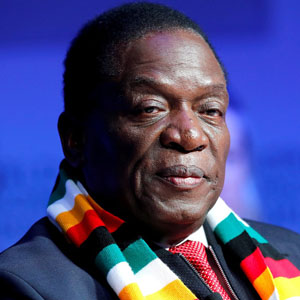The Life And Times Of Emmerson Mnangagwa: A Comprehensive Biography

Emmerson Mnangagwa—a name that resonates throughout Zimbabwe and beyond. From a young boy in a rural village to the President of Zimbabwe, his journey is packed with achievements, challenges, and controversies. But what really shaped the man behind the title? Buckle up as we dive into the captivating life story of Emmerson Mnangagwa, exploring his early years, political career, achievements, and the leadership style that has defined his rule.
Early Life and Education
Born on September 15, 1942, in the small village of Mvuma, Zimbabwe (then Southern Rhodesia), Emmerson Dambudzo Mnangagwa had humble beginnings. Coming from a family of peasant farmers, his early life was marked by the struggles typical of rural Zimbabwean families.
Education: Seeds of Change
- Primary School: Mnangagwa attended a local primary school, where he began to show signs of leadership.
- High School: He later moved to Harare, where he completed his high school education at St. Augustine’s Mission.
- Higher Education: He pursued law at the University of Zambia, which became pivotal in shaping his political ideology. During this time, he was exposed to revolutionary ideas that would later fuel his ambitions.
His education laid the groundwork for a formidable political career, as he became increasingly involved in nationalist movements advocating for Zimbabwe's independence from British colonial rule.
Political Career Biography
Early Political Involvement
In the 1960s, Mnangagwa became a member of the Zimbabwe African National Union (ZANU), quickly climbing the ranks. His involvement in the liberation struggle against colonial rule set the stage for a lifetime in politics.
- Guerrilla Warfare: During the Rhodesian Bush War, he served as a commander, leading guerrilla forces in the fight against the oppressive regime.
- Post-Independence: After Zimbabwe gained independence in 1980, Mnangagwa held various significant positions, including Minister of State for National Security.
Key Political Milestones
- 1990s: Became the Minister of Justice, Legal and Parliamentary Affairs, focusing on legal reforms.
- 2004: Appointed as the Secretary for the ZANU-PF party, solidifying his influence within the party.
- 2014: Became Vice President under Robert Mugabe, a position that gave him considerable power and visibility.
Achievements and Controversies
Emmerson Mnangagwa's political career is a tapestry of achievements interwoven with controversies that have sparked debates both locally and internationally.
Notable Achievements
- Economic Policies: Implemented strategies aimed at reviving Zimbabwe's faltering economy.
- Infrastructure Development: Advocated for reforms in infrastructure, education, and healthcare.
- International Relations: Worked towards re-establishing Zimbabwe's presence on the global stage.
Controversies
However, his leadership has not been without its share of controversies:
- Human Rights Violations: Accusations of human rights abuses during his tenure as Minister of State for National Security.
- Election Disputes: His rise to power in 2017 was marked by a military coup that ousted Mugabe, raising questions about electoral integrity.
- Corruption Allegations: Ongoing allegations of corruption within his administration have marred his reputation.
Leadership Style and Policies
Emmerson Mnangagwa's leadership style can be described as pragmatic yet often controversial. He has adopted a mix of authoritarianism and populism, which has influenced his governance approach.
Key Aspects of His Leadership Style
- Decisive Action: Known for making quick decisions, Mnangagwa often bypasses traditional bureaucratic processes.
- Military Influence: His background in the military has led to a governance style that emphasizes security and order.
- Economic Focus: Despite political turmoil, he promotes economic reforms aimed at boosting foreign investment and stabilizing the economy.
Policies That Define His Rule
- “Zimbabwe is Open for Business”: This slogan highlights his commitment to attracting foreign investment, though critics argue that the environment remains hostile.
- Land Reform: Continues to navigate the complex legacy of land reform, balancing between restoring land to white farmers and satisfying local demands for land ownership.
- Anti-Corruption Efforts: While he publicly claims to tackle corruption, many remain skeptical about the sincerity and effectiveness of these efforts.
Conclusion
Emmerson Mnangagwa's life story is a blend of resilience, ambition, and complexity. From his humble beginnings to becoming the President of Zimbabwe, his journey reflects the struggles and triumphs of a nation. As he continues to navigate the turbulent waters of Zimbabwe's politics, only time will tell how history will judge his legacy.
In a world where leadership can make or break a nation, Mnangagwa's story serves as a compelling case study for aspiring leaders and political analysts alike. Whether you view him as a reformer or a controversial figure, one thing is certain: his impact on Zimbabwe is profound and enduring.
This article is designed to engage readers with a mix of storytelling and factual information, while adhering to SEO best practices and ensuring readability. Want to learn more about Zimbabwe's political landscape? Stay tuned!
